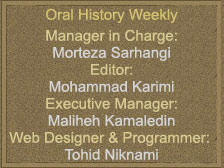| No. 224 | 18 October 2015 |
 Who Owns Oral History?Once an interviewee provides his memories for others through vocal or video interviews and archives them after writing and ordering, data is introduced which may be useful in different scientific or business aspects. The question is who will be the owner and the user of the data produced through oral history?Teacher Tells of War FrontsI would take the Camera on me!An interview with Mohammad Hussein QadamiOne of his stories has been adopted by Revayate Fath Group for a televised program. Revayate Fath (literally, Narrative of the Conquest) group is a renowned Iranian filmmaking team which focuses on the stories of the Iran-Iraq war and depicts real narratives of the war. The group was put together by Martyr Morteza Avini who was killed years after the war by explosion of a trapped mine left from the war.I handed the pictures to SAVAKDerived from “The Royal Photographer: Oral History of Mohammad Ali Davari”Mohammad Ali Davir is a veteran highly skilled photographer in Arak. He was interested in photography since adolescence and with his skills and creativity has had an effective role in promoting this industry in Arak. He turned his back to his class where land owners depended on their power to seek bless and happiness; he travelled to Arak with nothing and was amazed with the char of secretive world of pictures and he crawled to the corners of photographers and darkrooms to print faces when he realized that in this transitory world only photographs are left behind.Oral History of Islamic Revolution in Bushehr (3)In the following article, we will review the process of campaigns against the Pahlavi regime as well as the current of the Islamic revolution in Bushehr Province and in particular, the city of Bushehr. It also reviews the Islamic movement of the people of Bushehr in following the leader of the revolution Imam Khomeini (God bless his soul). Another goal of the following writing is to introduce the clergies and campaigners of Bushehr. Interviews have been conducted for collection of information. The first and second parts were presented to you and now here is the third part.Writing is storytelling no matter the genreJournalists are first and foremost story tellers. The stories we gather and pass on to our readers are sometimes routed in fact, numbers and sound bites from “authority sources” but they are still tell the story of our community and surrounding world. Oral History Weekly Magazine Aims and Regulations
Oral History Weekly Magazine wishes to create a suitable place for thoughts and idea development; Its main field would be “Oral History” and subjects as telling & writing memoirs, writing diaries, travelogues, chronologies, and all other subfields of history which are presented in the form of news, articles, reports, notes, interviews and memoirs can be included. There is no limitation on the length of would-be-sent materials. Mentioning the name, academic background and email is necessary. Articles with complete references and bibliography are more credited and an abstract would quite helpful. Weekly is not about to publish any material consisting insults and libels about other people or anything that brings anxiety to public opinion. Weekly can edit and translate the received materials. The published articles and materials are only the writer’s ideas and Oral History Weekly Magazine has no responsibility about their content. |
 Daughter of Sheena-53 Memories of Qadamkheyr Mohammadi Kanaan Wife of Sardar Shaheed Haj Sattar Ebrahimi Hajir Memory writer: Behnaz Zarrabizadeh Tehran, Sooreh Mehr Publications Company, 2011 (Persian Version) Translated by Zahra Hosseinian Samad’s going to and coming back from Mecca took forty days. Ten days more also elapsed until he throw his parties. As the days passed, he became more impatient and said: “I'll go crazy. It is fifty days I haven’t heard about my guys. I don’t know in what situation they are. I should go soon.” Finally he went to the front. I knew that I shouldn’t be waiting for him so soon. Once a forty-five days, he came back home, stayed a couple of days and then returned. Summer passed. Fall also came and went. It was winter of 1364. The last time he was on leave, I said to him: “Samad! This time you must be here. As you said, it is the last one!”    |
